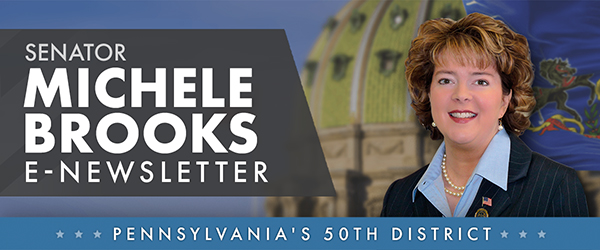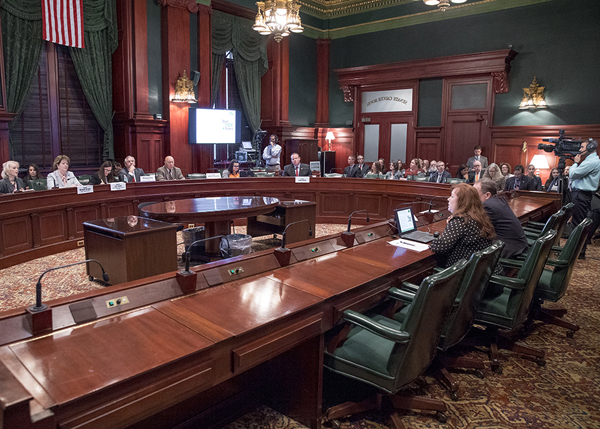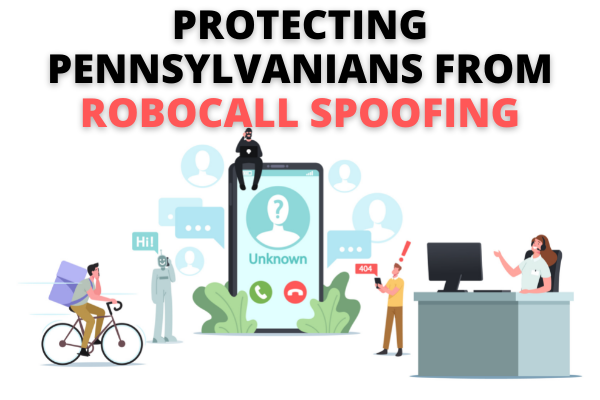
|
||||
|
In this Update:
Brooks’ Bill Approved to Make Handicap Placards More Accessible
The Senate Transportation Committee recently approved legislation introduced by Sen. Michele Brooks that will allow motorists and passengers in need of a temporary handicap parking placard to receive it on the day they bring their application into a legislative office rather than waiting, possibly weeks, to receive one in the mail from the state Department of Transportation (PennDOT). “We have heard from many seniors and others who have had a sudden injury or illness that leaves them immobilized, not only from injury, but from bureaucratic delays in receiving their placard,” Brooks said. “This legislation streamlines the process and makes it more responsive to individual needs.” Senate Bill 474 will still require applicants for a handicapped placard to obtain a health care professional’s approval to confirm medical need and to have their application notarized, but the process for obtaining the placard will be expedited. Under the current process for obtaining a temporary parking placard for a person with a disability, a legislative office mails the constituent’s application, which has been completed by a doctor, to PennDOT, who then mails the handicap placard directly to the constituent. As an alternative, the constituent may use an online application, which can take up to six to eight weeks to process. “For many, this waiting period can be very difficult or even detrimental to their health and safety. This piece of legislation puts people first, should reduce costs, and will allow constituents to leave with a handicap placard on the day they submit their application.” The bill now goes to the full Senate for its consideration. Brooks’ Legislation that Could Help Address Lyme and other Tick-Related Diseases in Schoolchildren Passes Senate
During a Senate hearing on Lyme disease co-chaired by Sen. Michele Brooks, an emergency room physician and other health experts strongly recommended that parents be notified when a tick is removed from their child in school. This notification would help them monitor their child for Lyme and other tickborne diseases and to seek treatment promptly. Pennsylvania leads the nation in Lyme disease cases, with a full one-third of these cases occurring in young children, according to the state Department of Health. In an effort to help combat Lyme and other tick-related diseases in children, Brooks’ legislation, Senate Bill 603, would preserve the tick that was removed from a child during school hours in order for the tick to be tested. The tick would be placed in a sealed container or bag for parents to either pick up at school or schools can send it in to test, if they so choose. Providing parents the option to have the tick tested free of charge at East Stroudsburg University through a funded program with the Department of Health is one of the first lines of defense in combating serious illnesses resulting from tick bites. Testing is not mandated, however. “With an ever-growing tick population, early detection and treatment are critical in ensuring a child’s full recovery from tick-related diseases,” Brooks said. “Left undetected or untreated, tick-related diseases can go on to create severe and debilitating health problems for children that could be lifelong. It is my hope that this program will provide an important tool for parents and schools to not only identify and seek treatment for these diseases, but to expand the awareness of what tickborne diseases may be prevalent in the area.” Senate Bill 603 is part of a three-bill package Sen. Brooks has introduced in this and prior sessions on Lyme and other tickborne diseases. The companion legislation proposes to ensure more comprehensive insurance coverage for Lyme disease treatment and testing, and to provide additional targeted training on Lyme disease and other tickborne diseases to doctors and other medical professionals. Recently, the Senate approved Senate Bill 603, which now goes to the House of Representatives for consideration. The free testing program is currently being conducted in partnership with the state Department of Health, forged with the help of Brooks. For more information on free tick testing for all Pennsylvania residents, please visit www.ticklab.org. Senate Approves Brooks’ Legislation to Prohibit “Spoofing” and Limit Robocalls
Pennsylvania moved closer to cracking down on deceptive and nuisance telephone calls with a recent unanimous vote by the Senate to pass legislation introduced by Sen. Michele Brooks to ban the practice of Caller ID “spoofing.” Spoofing misleads call recipients into believing that a caller is local by using a local number. However, this number is neither local nor accurate. It can be a telemarketer who is “spoofing” the number so it appears to be a local call or someone familiar. “Specifically, Senate Bill 236 would prevent spoofing and is designed to protect citizens from misleading telemarketing ‘robocalls,’ particularly those that disguise their real phone number by making it look like a local number, increasing the likelihood that the call will be answered,” Brooks said. These calls, to both landlines and cell phones, can not only be a nuisance but unfortunately can be scams that prey on trusting Pennsylvanians, and especially vulnerable senior citizens. Brooks said she introduced this legislation after hearing from a number of residents that spam calls are not only frustrating, but can be a true hardship for those who have difficulty getting to the phone. Brooks noted that the legislation also prevents telemarketing calls after 8 p.m. and before 8 a.m., and solidified the legal holidays on which these calls cannot be made. “It is my hope that this legislation will help to better protect Pennsylvanians from fraudulent calls as well as the many inconveniences caused by telemarketing calls at all hours of the day and night,” she added. Senate Bill now heads to the House of Representatives for consideration. |
||||
|
||||


Want to change how you receive these emails? 2025 © Senate of Pennsylvania | https://www.senatorbrooks.com | Privacy Policy |


